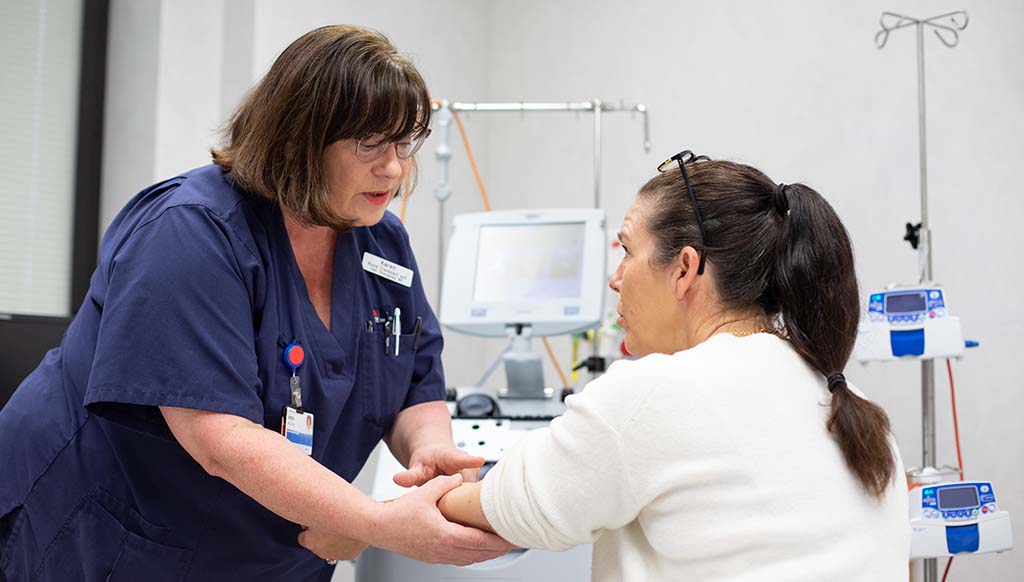Indications for CAR T-cell treatment
Standard of care CAR T-cell therapy is approved for patients with refractory or relapsed disease indications listed under eligibility criteria. This was approved by the Medical Services Advisory Committee (MSAC) of the Australian Government.
Treatment is provided for:
- adult patients at the Immune Effector Cell (IEC) Services at Westmead and Royal Prince Alfred Hospitals
- paediatric patients at hospitals of the Sydney Children’s Hospital Network.
Contacts
Adult
Westmead Hospital
A/Prof Emily Blyth
Emily.Blyth@health.nsw.gov.au
WSLHD-celltherapycoordination@health.nsw.gov.au
IEC consultant on call can be contacted via switchboard on 02 8890 5555
Royal Prince Alfred Hospital
Prof P. Joy Ho
Joy.Ho1@health.nsw.gov.au
Katrina Debosz NP Katrina.Debosz@health.nsw.gov.au
Paediatric
Sydney Children’s Hospital – Randwick
A/Prof Adam Nelson
Adam.Nelson@health.nsw.gov.au
Laura Chapman
Laura.Chapman1@health.nsw.gov.au
The Children’s Hospital at Westmead
Dr Melissa Gabriel
SCHN-TCT@health.nsw.gov.au

Referral
- Contact the IEC Service Contacts listed to discuss your patient.
- Raise any concerns regarding your patient’s urgency, relapse status or refractory level.
- Complete a disease specific referral form for CAR T-cell treatment for your patient. This is to confirm eligibility and obtain the clinical history of your patient.
- For Aboriginal and Torres Strait Islander patients, please highlight with the IEC Services. The Hospital Aboriginal Liaison Officer can then link with them as early as possible.
Treatment criteria
The following treatment criteria exist. The patient must:
- not have uncontrolled infection, including HIV or active hepatitis B or C infection
- have a World Health Organization (WHO) performance status of 0 or 1 (or ≥70 Karnofsky/Lansky score)
- have a condition that can be effectively managed during lymphocyte collection and manufacturing, to allow for the absence of rapidly progressive disease at the time of lymphocyte infusion.
Eligibility criteria
The eligibility criteria have been defined in the public summary documents published by Medical Services Advisory Committee (MSAC). For more information, contact the IEC Service.
Disease indication | CAR T-cell | Eligibility criteria |
|---|---|---|
Large B-cell Lymphoma (LBCL) including:
| Axicabtagene ciloleucel (Yescarta®) ONLY | Treated in the 2nd line Patients who are refractory to or have relapsed no more than 12 months after completion of first-line (1L) chemoimmunotherapy, including at a minimum:
# the date of completion of chemotherapy is defined by the last date of the anthracycline containing regimen. |
Diffuse large B-cell lymphoma (DLBCL) Primary mediastinal large B-cell lymphoma (PMBCL) Transformed follicular lymphoma (TFL) | Tisagenlecleucel (Kymriah®) Axicabtagene ciloleucel (Yescarta®) | 3rd line and beyond Patients who are:
|
Mantle cell lymphoma (MCL) | Brexucabtagene autoleucel (Tecartus®) | Patients with relapsed or refractory CD19-positive mantle cell lymphoma (MCL) who have received at least two lines of therapy, including:
|
Acute lymphoblastic leukaemia (in patients ≥ 26 years of age) | Brexucabtagene autoleucel (Tecartus®) |
|
Acute lymphoblastic leukaemia (in patients ≤25 years of age) | Tisagenlecleucel (Kymriah®) |
Note: relapse is determined by minimal residual disease (MRD) techniques using >1x10-3/0.1% as the threshold |
Patients must also have sufficient organ function, including renal, hepatic, cardiac and pulmonary function. The criteria is defined on the disease-specific referral for CAR T-cells.
Other treatments and studies
The first generation of CAR T-cell treatments have focused on the B-cell antigen CD19. There are several studies worldwide looking at alternative antigens and diseases (e.g. B-cell maturation antigen in multiple myeloma). Treatments using other lymphocyte subtypes (e.g. natural killer cells) to target cancer cells are also being explored.
The current TGA approved CAR T-cell treatments are manufactured from T-cells collected from the patient (autologous). Studies are investigating the advantages of cells manufactured from a donor (allogeneic). These so called “off the shelf” products may be more accessed quickly.
Antigen specific T-cells
There are currently several studies focusing on the use of antigen specific T-cells. Researchers in NSW are leading in this area of medicine.
T-cells can be manufactured from existing blood and marrow transplant products (autologous and allogeneic) or obtained from a cell bank. Research is focused on the effectiveness of T-cells targeting individual antigens (e.g. cytomegalovirus) or a combination of antigens (e.g. multi-virus). These treatments have shown promise in treating and preventing disease. These products are available as part of clinical trials. Visit Australian Clinical Trials for more information.